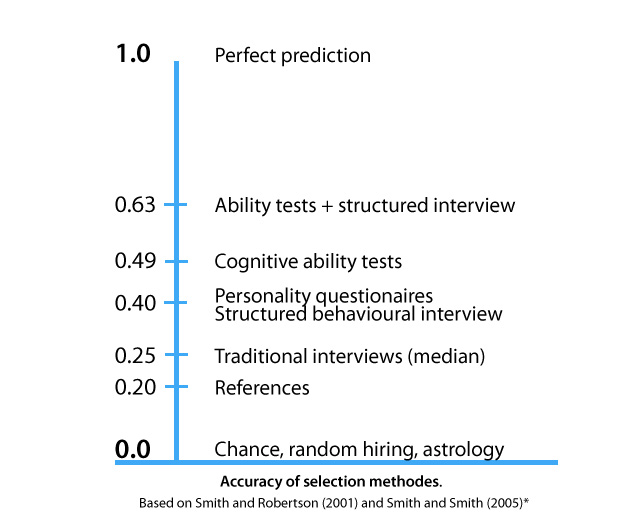Assuming you read the first part of the article, by now you have a general understanding of psychometric testing, and a basic idea of how to tell the cowboys from the cavalry when you want to find a trustworthy provider.
In this second part, we will discuss the benefits to look for and the pitfalls to avoid when it comes to applying psychometrics and understanding the results.

The major benefit of psychometric tests lies in their ability to help you make more objective, data-informed decisions. It was said that the first step in choosing the right psychometric tool is knowing what the problem is you are trying to solve and identifying what characteristics (e.g.: competencies, skills, personality traits) need to be assessed in order to help you solve this problem. Having done this, you can pick a valid tool that actually measures what you want to measure, and can accurately predict the outcomes of your decision. This latter is of paramount importance in a business environment, so let’s take a look at a key aspect of validity a little closer.
Psychometric testing: Effective but not stand alone tools
The “accuracy” of a tool is referred to as predictive validity. It is a statistical term describing the extent to which a score on a given assessment correlates with future success when measured against job performance indicators such as supervisory ratings. Predictive validity is typically measured using correlation. It is scored on a scale from 0 to 1 and tools with r scores closer to 1 have higher probabilities of predicting future performance effectively. This is why predictive validity is important when choosing a test!
Conventional selection methods like interviews, reference checks and biodata all have lower predictive power than psychometrics. While conventional employment interviews have predictive validity scores between 0.2 and 0.3, for cognitive ability tests these scores are around 0.5. Putting it into a business context: without considering other factors for the sake of simplicity, these scores mean that for a high performer on a traditional job interview the likelihood of being an above average performer in his future role is approximately 62%. This same probability for cognitive ability tests is around 75%. Do not forget that if you hired the next person you randomly met on the street, the chance of her being a high performer is 50%. It is like flipping a coin. Either yes or no, but you have absolutely no a priori idea of how it is going to be. So 62% is already good, 75% is very good.

It is important to note that psychometric testing works best when used in combination with other methods. Tests greatly enrich the information you can gather about an individual but, as with other selection methods, they only show part of the picture. Interviews and reference checks can show things tests cannot and vice versa. When different methods are used in conjunction it increases the overall predictive force of your selection process, giving you a higher confidence that you are choosing the right candidate.
Is psychometric testing going to turn my HR processes upside down?
It is up to you. Psychometric testing has the potential to help you reengineer your HR processes, but it is absolutely not a must. Well considered psychometric tests will compliment your existing methods and it is your decision how much to rely on them. You can use the insights gained by psychometric assessment as a guide to structure your interview questions. However, you can also choose to replace existing methods by psychometric testing. It is a common practice to abandon phone interviews in favour of psychometric testing to preselect candidates for the personal interviews or assessment center. Placing them well within the process can save significant time and resources.
It is always good to know in advance what the intended use of the test is and you should discuss with your provider how they can fit into the rest of your process. This is true for the technical aspects as well. Check if your provider offers an online psychometric test platform or if the tests will be running on your own infrastructure. Check what IT integration is needed, because this can be costy. Check that results are reported in a clear format and that they can be fed into your existing system easyily.
Easy to use?
The question of ease of use is not only important from the HR or the IT departments’ point of view. Keep in mind who is going to take the tests eventually and to see if the user interface, the instructions, the platform’s stability and accessibility make the test easy to use and let test takers concentrate on doing their best. This can reflect very well, or very poorly, on your recruitment process. Try a demo test or request a trial, and if you do not like what you see just try another one.
Price is not an indicator of quality anymore.
It could be argued that test interface design will not improve any core value of the test. However, think about who is going to take the test? If you are using psychometric testing for selection, chances are that completing a test will be one of the first experiences a candidate has with your company. The test platform will be part of your company’s image. A well designed, highly user-friendly platform strenghtens your reputation the same way a good customer service interface does.
If the system is counterintuitive or ugly, it will demotivate candidates and lower performance. The flipside of this is that a clean, intuitive system will reflect well on your company and make them want to perform as best they can. Test providers recognized the additonal value candidate’s experience of psychometric testing can create in building your brand, and some of them offer you the option to brand the online test interface your candidates will be using.
How much all this is going to cost me?
Psychometric testing is used to make down to earth business decisions, so financial considerations are critical. Used as a workforce science it leads to lower staff turnover rates, helps you to identify talent, and foster organisational efficiency, which will all increase your bottom line. Therefore, if you believe in the values behind psychometric testing, and I hope by now you do indeed, your first concern should always be the quality of the tool. Using a badly designed test will cost you much more in lost revenue and wasted resources than what you can save on the price.
However, price is not an indicator of quality anymore. Thanks to the wonderment we call the internet, well researched, valid and reliable tests running on online platforms are available today at prices affordable for every company. New pricing models are also appearing on the market: now you are not obliged to pay per individual candidates or assessments, you can also choose subscription based plans if those fit your needs better.
Reading the results and providing feedback
The meaning of the results varies by test types. Ability test scores can be given in percentiles comparing the candidates’ results to a norm group, or in absolute values. Usually the overall scores are expanded upon and separate scores for speed and precision are also shown, which provide important insights in some cases. With personality tests, the interpretation is even more delicate, as there are no right or wrong answers. These tests show how the individual would typically behave in certain situations, and “good” or “bad” are relative to the specific job or team fit requirements.
Read a sample report before you start using any tool. Make sure it details for each test type how the results are to be interpreted, what they mean and what they do not. If any questions remain, someone from your provider should be available to talk you through the report. In most cases, this will be sufficient to prevent misuse while keeping administration costs low. When using a particularly technical or complex psychometric tool, earlier in the process a trained assessor or psychometrician might be necessary to help you correctly interpret the results. However, after a few rounds of consultations you are likely to become more independent in these as well.
Feedback can be an important motivator, thus a good way of keeping participants engaged during the testing process. Whether existing staff or new candidates, feedback promises test-takers that they can learn new things about their favourite subject: themselves. If you provide feedback, make sure candidates understand how their results should be interpreted, as both intelligence and personality tests can touch sensitive points.
Summary
We began the first part of this guide by asking: Should I be using psychometric testing? Hopefully, by now you too have an answer for it, but here is ours as a conclusion: Yes, you should. However, know what you need it for, find a trustworthy provider, pick the right tool, use it right and make the most of the data it provides you with.
Talentsift offers psychometric ability and personality tests and the best online assessment centre solution on the market. We help you in your decisions throughout the selection process. Try our tests. It’s free!